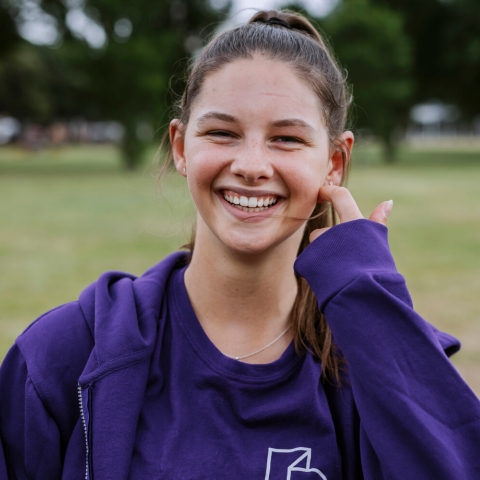
Sidebar navigation

UCAS applications in?
Here's what comes next for students
Your students have done something amazing in applying to uni. And submitting a UCAS application will feel like a huge weight off their shoulders.
So while the next steps can feel a little uncertain, the key is to make sure they're prepared for all outcomes. What type of offers can they receive? How do they respond to offers? What are the key dates? What if they feel like they won’t meet the conditions of the offer?
Here, we answer all these questions and more.
Important dates in the 2025 UCAS calendar
There are a number of deadlines that students must meet to ensure a successful application. UCAS track will take over to notify them of things like offers and interview requests. Here’s some key dates to remind them of, but please note that these can change year-on-year:
- 3 September – completed applications can be submitted to UCAS
- 15 October – UCAS deadline for Oxbridge and Medicine, Vet Science and Dentistry courses
- 29 January – UCAS deadline for all other courses
- 26 February – UCAS Extra opens
- 14 May – university decisions due on applications made by 29 January
- 4 July – UCAS Extra deadline
- 5 July – Clearing opens
- 14 August – Results day
- September-October – Enrolment*
*Enrolment can be anytime between September-October and will be different at each university.
What happens after submitting an application?
Once universities receive a student's application from UCAS, they'll assess their suitability for a chosen course. They’ll review their qualifications, personal statement, teacher reference and any exceptional circumstances or personal barriers that they may have faced.
Some universities and courses require an admissions test and/or an interview to assess students’ suitability, which can take place anytime between November to March.
Some of our courses at Portsmouth need an interview or an admissions test before we can make a decision on their application. Find out by checking the course page on our website and the UCAS course search. Interviews and tests vary between courses, but we'll always tell students what to expect, what to bring and where to go when we invite them to meet us.
Once universities make a decision, they’ll write to students to let them know of the outcome. This can take 2-3 weeks at busy times, so it’s good to get applications in early.
Tracking a UCAS application
Once students submit their application, it becomes ‘UCAS Track’ within their UCAS Hub. This useful portal helps track the progress of an application, accept and decline offers, and defer or switch their university course details.
And once in their UCAS Hub, students will see ‘status’ and ‘next steps’ information for their applications. Status indicates if the university has made an offer or not, and ‘next steps’ looks at the road ahead – which, could be an invitation to interview, request for additional information, or to wait a little longer for a university’s decision. UCAS Hub will also remind students of any deadlines they have.
Types of university decisions and offers
For student who apply by the main UCAS deadline in January, all universities are required to give a decision by May. Decisions can be made earlier but depend on when students submit their applications, and if they need to do an interview or test.
- Conditional offer – The offer is based on achieving certain criteria, such as entry requirements.
- Unconditional offer – The place is offered regardless of their results, or if they already have their results.
- Invitation received – The student has been invited to do an interview, and/or an admissions test.
- Unsuccessful – The university was not able to make an offer for this course.
- Withdrawn – The university has suspended or closed the course choice they have applied for.
Using UCAS Extra
Things don’t always go to plan. And that’s ok, because there are plenty of options for students – whether they’ve changed their mind about a course and/or university, declined all their offers or not received any offers, they can find a place through UCAS Extra.
Running from February–June, any students who haven’t submitted an application before the January deadline can also apply to university via UCAS Extra. But remind your students that it's only available for courses that still have vacancies.

Undergraduate Open Days
Thinking about joining us as an undergrad? Book your spot at one of our upcoming Open Days.

Chat to our Students
Find out more about Portsmouth from the people who know it the best – our students.
Next steps for students after receiving their offers
Receiving offers is an exciting and nervy time. After all, they’ll need to respond to the offers once they've heard back from all of their choices. To help with those big decisions, we suggest the following useful tips.
Attend Open Days
There’s no better way to get a feel for a university than attending an Open Day. Before diving into a new chapter of their lives, it's best to see if a university and course is right for them, as well as potentially a new city.
Understandably, it's not always possible to attend, but there are other ways to visit after they've submitted their application. Offer Holders are usually invited to additional Open Days specific to their course. This is an excellent opportunity for those who couldn't attend an Open Day to hear from academics, explore the course structure, learning and assessment methods, and to tour the facilities.
Explore accommodation options
When students receive offers from universities, they'll also get details on how to apply for a room in university accommodation.
Where an accommodation guarantee is offered, as we do at Portsmouth, there are usually criteria involved, such as deadlines to apply.
Make sure to advise your students to start looking at their accommodation options, and to apply early if they can, which will hopefully mean they get their preferred accommodation choices.
Apply for Student Finance
Students don’t need a confirmed place at university before they can start applying for Student Finance.
Applications usually open in the Spring before their course starts and can take up to 6 weeks to be processed, so it’s worth starting as early as possible.
Speak to other students
The road to HE is often brings up lots of questions. And who better to answer those questions than current students.
At Portsmouth, your students can start chatting now using tools like Unibuddy, filtering by course and nationality to discover what it's really like to study here. Forums like The Student Room are also a great place to ask questions and meet fellow offer holders.
Replying to offers
Once responses are in, students will need to decide which offers to accept as their firm (first) choice and their insurance (back up) choice on their UCAS Hub. They’ll then decline all other offers that they may be holding. If a student changes their mind at this point, remind them that they can also decline all of their offers to enter UCAS Extra – and find their dream course this way.
Students shouldn’t be put off by offers that are higher than their predicted grades. They should still consider these offers and use them as an aspirational choice to encourage them to do well in their exams. If on results day they don’t meet the grade requirements, depending on the university and course, they often look back at the student’s applications again and may decide to still accept them with a lower grade. Student’s insurance choice should have a lower entry requirement than their firm choice, as it is there too fall back on should students not meet the conditions of their first choice.
What happens on Results Day?
Results day is a time to celebrate how far your students have come. But it’s also a busy day. Students are not only finding out what grades they've achieved, but whether they've secured their choices.
And so begins the final step of the process. If students meet the requirements of their offer, their status on their UCAS Hub will change to show that their place is confirmed. That’s it – time to to relax, enjoy their summer and look forward to starting university in September.
For students who didn’t meet the conditions of their offer, universities may look at their application again. They’ll look to see if they will accept a lower grade to confirm their place, taking into account extenuating circumstances or additional information provided, and revisiting the student’s personal statement.
If universities can’t offer a student a place on their chosen course, they’ll often look to see if they can offer a different but aligned course, which the student will have the option to accept or decline.
For students who are unsuccessful in getting a place, or declined a change of course offer, they will go into Clearing.
Finding a place through Clearing
Every year 1000s of students find their ideal undergrad course through Clearing. Your students can apply through Clearing if:
- They don't meet the conditions of their offer for their firm (first) or insurance (second) choice courses
- They change their mind on the course/university
- They’re applying after the UCAS Extra deadline
This is the last opportunity to apply and get into university for the coming year – and will depend on vacancies at each university. Understandably, this might feel like an overwhelming time for students. But we'll always be there to support them through the process. As will lots of universities.
We recommend researching UCAS Clearing pages before Results Day. And preparing a list of chosen courses, universities and hotlines, just in case they get any surprises. They'll also need their UCAS ID, qualification details and the course code they wish to apply to.





